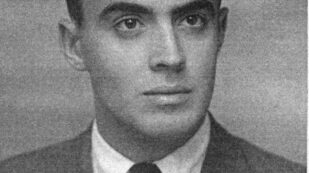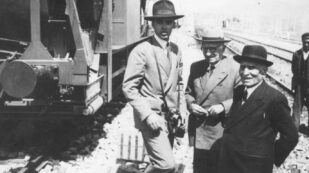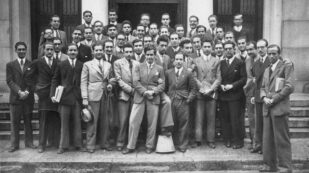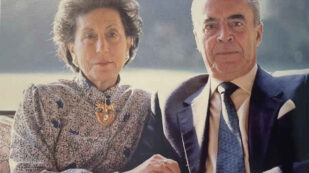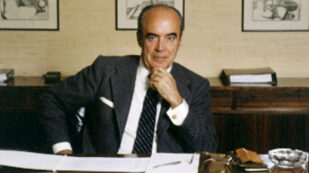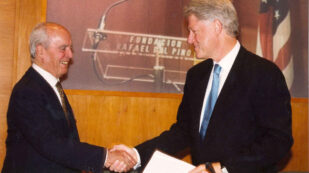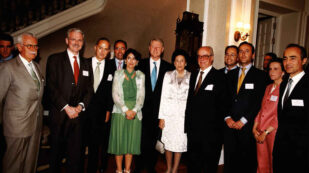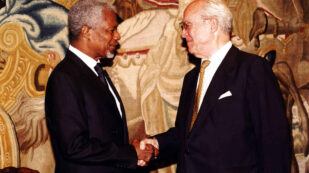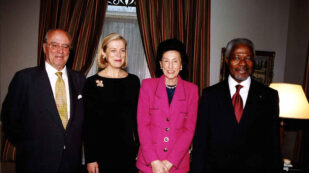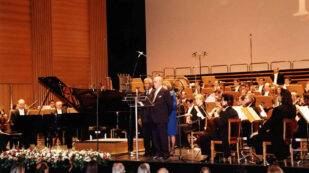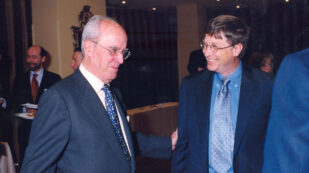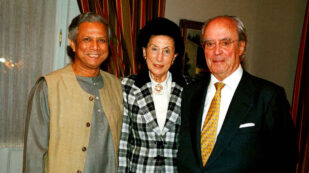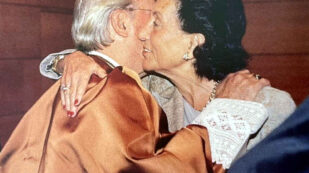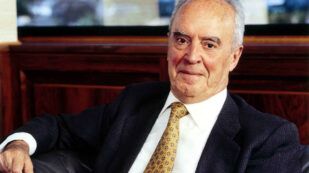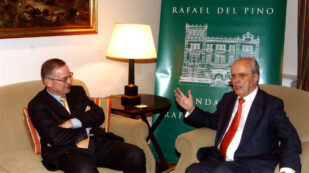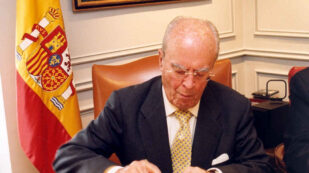Rafael del Pino y Moreno was one of the most important Spanish businessmen of the 20th century. With a doctorate in Civil Engineering, he launched his own project in the autumn of 1952 after his first steps in the construction sector. To do so, he travelled around Europe beforehand, observing how railway lines were being built in other countries. In Germany, he bought the necessary machinery to export the model to Spain. With the new tools and "always eager to work and move forward", Rafael del Pino founded Ferrovial. The first office occupied an attic next to the Jerónimos Church in Madrid.
Originally dedicated to track renewal and the operation of sleeper replacement workshops, Ferrovial began its first project in the province of Burgos, followed by numerous projects in other parts of Spain. The company soon demonstrated its international vocation - with the construction of a road in Venezuela in 1954 - and broadened its horizons during the 1960s to build roads, hydroelectric dams and water treatment plants. One of the milestones that marked this stage was the construction of the Bilbao-Behobia motorway, which marked the company's entry into the transport infrastructure concession business.
Ten years after its foundation, Ferrovial had 500 employees and a turnover of 126 million pesetas, equivalent to 25 million euros in constant terms.
Despite the crisis of the 1970s, Rafael del Pino led Ferrovial's internationalisation and diversification of the company into the concession market, property development, urban services and infrastructure maintenance ... . This entrepreneurial vision - based on initiative, creativity, method and measured risk - led him, in 1978, to build roads in Libya, a major project that represents the first steps on the company's successful international path.
Since then, Ferrovial has established itself in the global market as the benchmark for innovation and sustainable management that Rafael del Pino imagined in 1952, with a presence in more than 15 countries, a workforce of close to 70,000 employees and a turnover of 7,446 million euros in 2011.
Rafael del Pino often insisted that his success was based on knowing how to surround himself with capable collaborators who were enthusiastic about the Group's growth projects, with principles such as "...".service to society, the love of things well done, the spirit of effort, austerity in spending, reinvestment of profits, constant adaptation to an evolving society" y "always looking to the future".
Following this successful career, in 1999 he founded the Rafael del Pino Foundation and, in 2000, he stepped down as Chairman of Grupo Ferrovial, although he remained Honorary Chairman until his death in 2008.
Since then Rafael del Pino has decided to dedicate himself to the Foundation that bears his name with the aim of "to give back to society part of what society has given me throughout my personal and professional life.". In doing so, he had the express support of his family.
During his long career, Rafael del Pino also chaired several companies, such as Europistas, Empresa Nacional del Gas (Enagás) and Philips Ibérica. Founding member of the Círculo de Empresarios (1977) and chairman of the employers' association Seopan, he was a member of the Executive Standing Committee of the Banco Central Hispano Americano, chairman of the Board of Directors of the Instituto de la Empresa Familiar and Director of the Asociación para el Progreso de la Dirección, among other positions.
Rafael del Pino became, on his own merits, a reference in the sector, which he shared his ideals and his entrepreneurial and enthusiastic spirit. He received some of the highest public distinctions, such as the Grand Cross of the Order of Civil Merit, the Gold Medal for Merit at Work, the Gold Medal of the Royal Academy of History, the Gold Plaque of the Spanish Royal Academy and a doctorate 'honoris causa' from the University of Castilla-La Mancha.
In the private sector, he also received numerous awards, such as the "Best Businessman in Construction and Real Estate Development", "Best Business Career" and the Gold Medal of the Spanish Road Association. In 2006 he received the 19th Juan Lladó Award, which the Instituto de Empresa and the Fundación Ortega y Gasset grant for efforts in cultural patronage and research.
His concern and entrepreneurial spirit led him in 1999 to create the Rafael del Pino Foundation, with the aim of ".contribute to improving the knowledge of the leaders of the Spain of the future, to promoting individual initiative and to fostering the principles of free markets and free enterprise. Our leaders have shown that with tenacity and effort they can reach places of excellence in all fields of knowledge and professional and business activity. It is worthwhile that they can successfully develop their skills in an increasingly globalised world, in which competitiveness is a key benchmark.".
"We all have a great task ahead of us: that of helping to ensure that the knowledge inherited from others, together with our particular added value, continues to be passed on to the next generations in freedom. All of this through service to others and through our dedication, our effort and our sacrifice. And if we apply our knowledge in this way to improve the well-being of more people, we will have done our duty and we will have contributed a little to making it easier for the inhabitants of the Earth to live together.".
"Things must be done with love"he used to repeat to his collaborators, "with a cool head but a warm heart".
Rafael del Pino died in Madrid on 14 June 2008.
